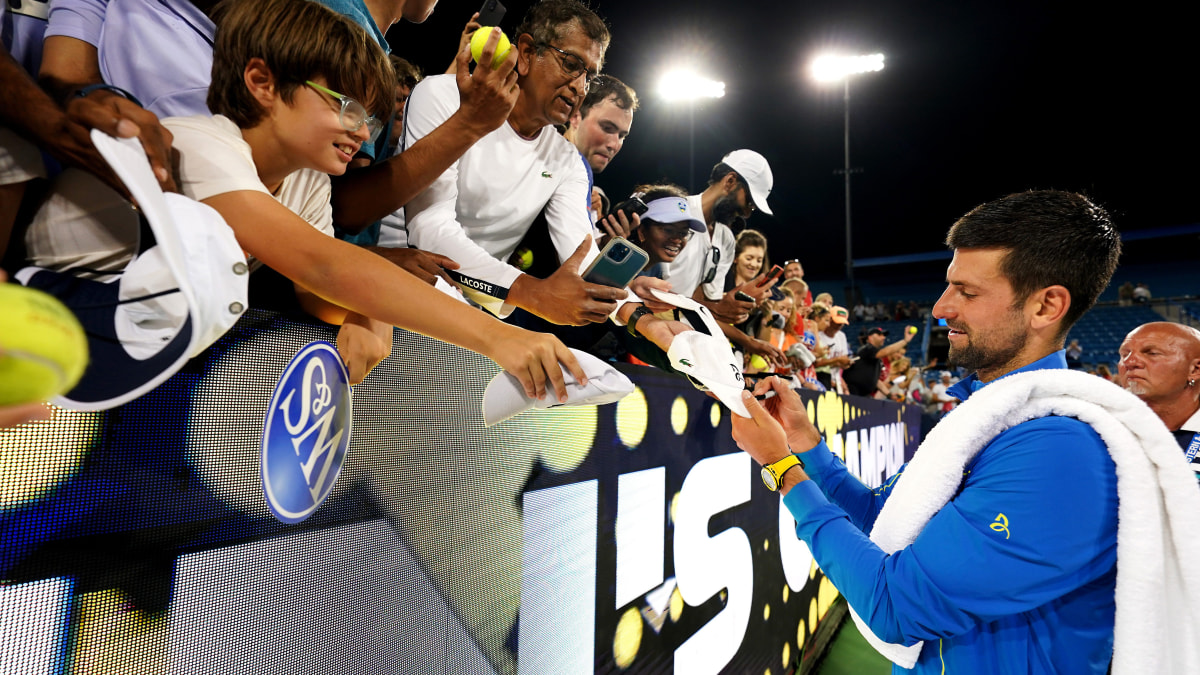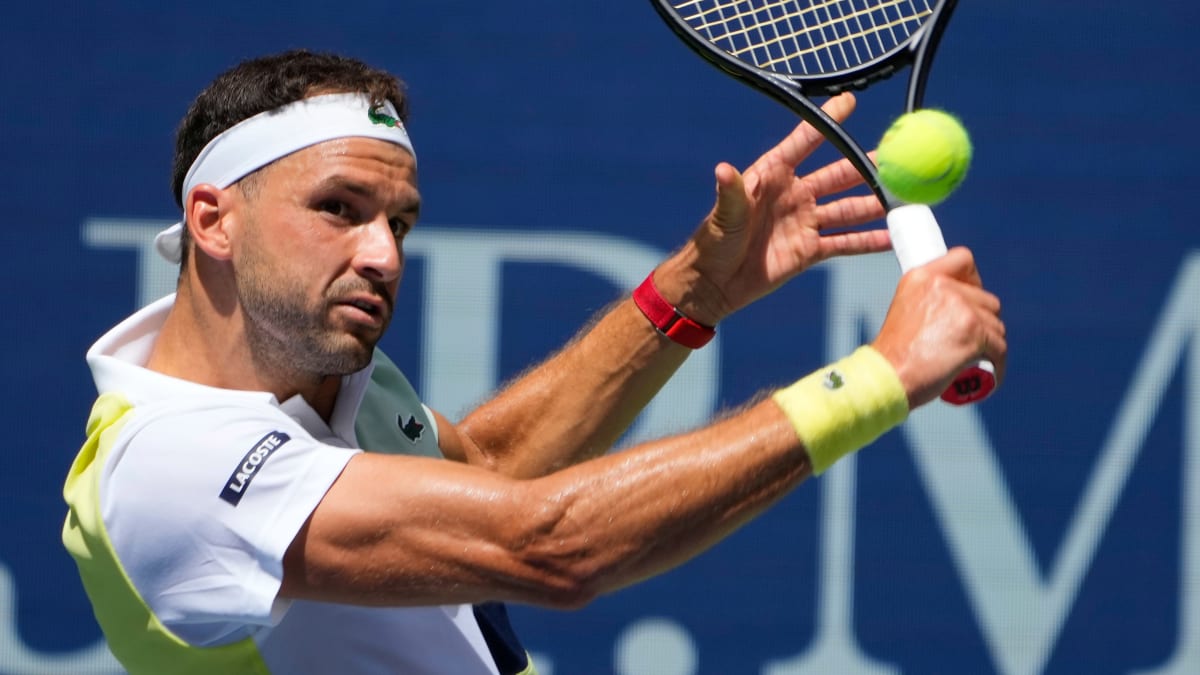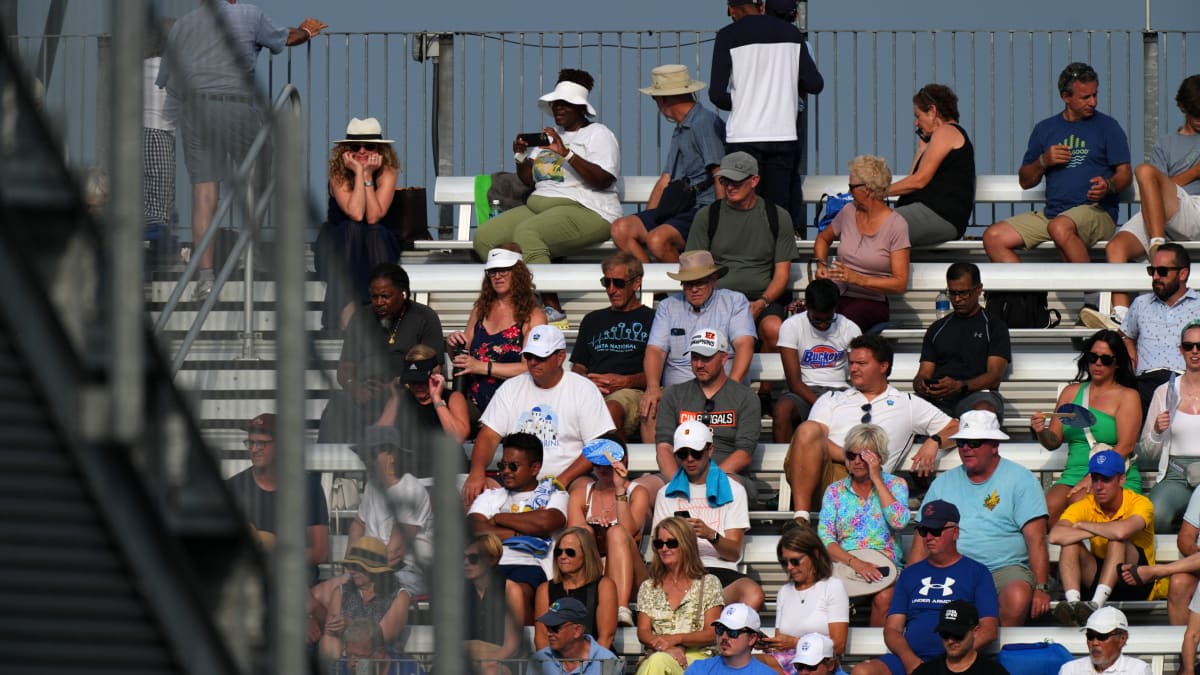Hey, everyone …
• Some interesting additions and subtractions—and no WTA Finals announcement—in this 2024 WTA calendar announcement.
• Hat tip, Kathy Rinaldi, who completed her stint as U.S. Billie Jean King Cup coach … and what a send-off.
• Welcome back, Sabine Lisicki.
Come for the Q&A, stay for the reader riff …
Jon, Novak Djokovic has now finished the year at No. 1 for the EIGHTH TIME. He went 27–1 at majors. He is 36 years old. What an absolute joke. Do you have a sense of what is motivating him to keep achieving like this?
David O.
• We’ll have more to say about him in the coming weeks. But I think you hit on a critical component of his dominance. Apart from everything else—the return, the flexibility, the peerless conditioning—his ability to self-motivate is a critical component. For the first 15 years of his career, the motivation was obvious, chasing Roger Federer and Rafael Nadal. They set the standard—yea high—and he knew what meeting/exceeding it entailed.
Lately he has found other incentives. Keeping the kids at bay. Avenging Wimbledon. Pursuing Olympic gold. Padding his majors lead. Even subconsciously, it would be easy for him to throttle back. I’ve won 24 Grand Slams. I’ve surpassed Federer and Nadal. I’m closing in on $200 million in prize money. I’m supposed to get up for this Tuesday’s session at some indoor event? Come on.
Yet, he’s found a way to stay sharp. Some of this is by looking outward, continuing to impose his will on the field. Some of this is by looking inward and challenging himself. In both cases, it’s not only admirable but a real portal into what has made him this pole star.

Kareem Elgazzar/The Enquirer/USA TODAY NETWORK
Jon, I saw your answer last week about Alexander Zverev and your calling for him to be suspended. I am wondering why you never (to my knowledge) called for a suspension of Nick Kyrgios, who was also accused [of domestic violence].
Anon
• Fair question.
I can’t stress this enough: No one is condoning Kyrgios or saying his incident was acceptable behavior. But let’s not conflate. Kyrgios denied abuse but admitted to shoving aside a former girlfriend. He apologized. In court, “Magistrate Beth Campbell heard his guilty plea then dismissed the charge, accepting the seriousness of the matter was ‘low level,’ meaning a conviction was not recorded.”
Another pause to stress that no one is condoning what Kyrgios did.
Where were we? Right. Compare that to the fact pattern surrounding Zverev, and the differences are stark. In the case of Zverev, two women have claimed multiple acts of physical violence. There are detailed accounts. The alleged acts occurred over time on multiple continents. There is a level of specificity to the allegations. There are photos and contemporaneous accounts corroborating the allegations. There are remarkable parallels between the two allegations. In one case, the woman did not pursue criminal charges, and an ATP-ordered investigation resulted in insufficient evidence (which is different from exoneration) to warrant discipline. In another, a Berlin criminal court heard the account and imposed a “penalty order” of nearly $500,000. Zverev responded to the claims earlier this month at the Paris Masters, calling the charges “complete bulls--- … and anyone that has a semi-standard IQ level knows what this is about.”
He is entitled to reject the allegations. He is entitled to a public trial. But in the interim, he should not be playing. In the absence of a domestic violence policy, the ATP has said that it will rely on the legal system. (ATP Rules 8.05 A (2) (c) and (d): A civil or criminal charge or conviction is a sufficient ground to suspend a player as a result of “conduct contrary to the integrity of the game.”)
Well, a legal system has now weighed in. As Josh Levin pointed out, when a player tests positive for doping, they are suspended from the workplace as they prepare an appeal. In the face of multiple domestic violence allegations against women—with a court hearing the evidence and imposing a significant fine—a player is allowed to continue?
This is nothing personal against Zverev. (Though it is probably admissible evidence that this is the same player who perpetrated the most violent on-court act in recent memory.) But simply lay out the facts. In most other sports, a similarly accused player would be suspended.
In tennis, the moral compass looks to be directionless.
Does the ATP have a plan with respect to automated line calling, or is it entirely up to each venue whether to use it or to employ line judges? We are surprised to see two Masters 1000 tournaments—Shanghai and Paris—and even more so the Tour finals using line judges.
D&S
Jon,
From your mailbag today, regarding Grigor Dimitrov: “The greatest player from Bulgaria? Sure.”
I know you may have meant greatest male player from Bulgaria—and I’m not criticizing you for not specifying that—but just for fun: Manuela Maleeva or Grigor Dimitrov? Who had the better career? (Come on, how often do you get to write about a Maleeva sister these days?) I vote Maleeva.
Srikanth
• We stop at little to name-check the Maleeva sisters. Maggie—who, I might add, was exceedingly gracious and accessible when I first started covering tennis many moons ago—is probably the most accomplished of the brood. She got to No. 4 and won 10 titles, though she only once got beyond the fourth round of a major. (And reached the fourth round a whopping 15 times.) Compare that to Grigor, who got to No. 3, won eight titles and made the semis at three of the four majors. Advantage, Dimitrov, no?

Robert Deutsch/USA TODAY Sports
As for Steffi Graf’s low post retirement profile, allow me some dime store psychoanalysis: 1) her natural demeanor is one that eschews the spotlight and; 2) some (or a lot) of guilt that despite her greatness, many of her GS wins were due to the fact that Monica Seles’s dominance over her was ended by a crazed compatriot. Could this be akin to some sort of survivor’s guilt?
To your point in your column, way more important issues right now than tennis but, the column has been a refreshing break so, thanks as always.
Neil Grammer, Toronto
• Thanks much. I want to be clear: No one should begrudge Steffi Graf her privacy. If she never wants to make another public appearance or grant another interview again, that’s totally her prerogative. If anything, her conviction and commitment to privacy is to be admired. (Especially when other former athletes have such a hard time resisting look-at-me, please-reassure-me-I’m-still-relevant impulses). Your point about Seles and survivor’s guilt is interesting. Obviously, we can only speculate. But I do suspect that, if not nothing else, she is not inclined to put herself in a position to take questions on the matter.
Hi Jon; I have a possible solution to the ratings bummer that comes from seeing vast rows of empty seats during televised tennis matches. Like a lot of good things in life, my proposed remedy centers around pizza. (In my day, free pizza was the bait used most often to lure teenagers and young adults to events they might otherwise skip.) I’ll leave it to people at a higher pay grade than me to figure out the logistical details, but here’s the gist—you lure enthusiastic high school, collegiate and recreational tennis players within commuting distance of a tournament venue with the promise of free pizza and grounds admission. After the first or second changeover, you flood the seats on televised courts with these audience extras. Voilà, all of a sudden you have a vibrant crowd adding excitement to the broadcast for fans watching the action on TV.
Teddy C., NYC
• I love it. Pizza, that is. And your idea. Maybe tacos, too?

Kareem Elgazzar/The Enquirer/USA TODAY NETWORK
Shots
• “ATP Tour events in Dallas, Doha and Munich will be upgraded to ATP 500 status from 2025, part of an unprecedented set of reforms to strengthen the tennis calendar. The three event upgrades are set to deliver benefits for fans and players alike, with more action and playing opportunities at bigger events. It marks the ATP’s latest move to enhance the sport’s calendar and premium product, a core objective of the OneVision strategy.”
Left unsaid, this means the elimination of events at places like Newport and Atlanta.
• André 3000 and Big Boi … Jack and Meg White … Eric B. and Rakim. Add Kateřina Siniaková and Barbora Krejčíková to the list of successful duos who decided to part ways.
• Clean winner, Amanda Knox.
• Chris Molanphy has a new book on Lil Nas X.
Take us out, J. Smith …
Hi Jon,
In your “50 Closing Thoughts” column on the 2023 U.S. Open, in response to a reader who questioned Coco Gauff’s acceptance speech, in which she thanked “the people who didn’t believe in me,” you responded, “What a pity she would fixate on the minuscule minority of trolls who, likely, know nothing about tennis. What a pity she wouldn’t recognize that she is adored.”
Let’s be clear, Coco Gauff and her team certainly understand that [she] is adored (by many); however, she is also crystal clear that popularity doesn’t insulate her, as a Black athlete, from soul-crushing racism on a daily basis. On [X, formally known as Twitter] yesterday, Coco Gauff elaborated even further on this issue when she said, “Death threats, racism, body shaming, it’s exhausting!”
From Tiger Woods being called a “little boy” and told “not to serve fried chicken, collard greens or whatever the hell they serve,” to Black soccer players this summer subjected to “fans” throwing bananas on the field, to the late great Hank Aaron, who received over 300,000 pieces of hate mail while breaking Babe Ruth’s home run record, racism in sports is a daily assault on one’s mental health AND a sad reality unique to Black athletes.
To be clear, while all athletes face vitriol from disgruntled gamblers, trolls and bots (such is the age of social media), we all—sportswriters included—do a huge disservice in eradicating the scourge of racism when we perpetuate this false narrative that sport is some colorblind world where it’s all about achievement. Sadly, this is not the reality for 19-year-old Coco Gauff nor 18-year-old Serena Williams before her (e.g., Indian Wells). All too often, over the years, we have seen Black athletes such as Derek Jeter lauded as “class acts” (which basically translates to never addressing the ugly truth about racism). In contrast, athletes such as LeBron James are often labeled by the media as “angry” and told to “shut and dribble,” when they dare to refute this false narrative of sports as some colorblind world where only accomplishments matter.
In conclusion, I submit to you that Coco Gauff wasn’t “fixating on trolls” but rather, addressing the elephant in the room called racism. Contrary to popular belief, racism isn’t going to just magically disappear by pretending it doesn’t exist. After starting out her speech by saying, “I tried my best to carry this with grace,” [Gauff] then proceeds to adroitly tackle the issue head-on. While I’m sure her handlers have all warned her about the potential negative economic impact on her marketability/brand when she addresses unpopular subjects such as Black Lives Matter, etc., it is abundantly clear that Coco Gauff is the granddaughter of a civil rights activist, so refusing to speak “truth to power” just isn’t an option for her. As a proud American, I must say that I am extremely proud not only of this amazingly self-aware young lady but also [of] this entire new generation of young Black athletes like Coco (here’s looking at you, too, Naomi Osaka), who aren’t afraid to use their platforms to address unpleasant subject matters, for the betterment of all of us.
Respectfully,
J. Smith







